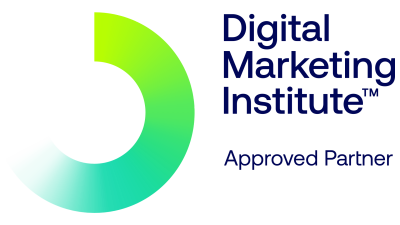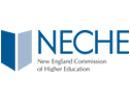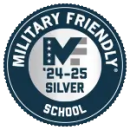MKCM 101: Introduction to Video Storytelling and MKCM 102: Foundations of Visual and Digital Design
Explore Digital Marketing
Champlain College Online's Bachelor of Science in Digital Marketing offers a comprehensive education designed to prepare you for the fast-paced world of digital marketing. Our program, accredited by the Digital Marketing Institute (DMI), equips you with essential skills in e-commerce strategy, consumer behavior, market research, digital analytics, social media marketing, and more.
Throughout their journey, students will engage in hands-on, project-based learning opportunities that encourage the application of their knowledge to tackle real-world digital marketing challenges. In addition to earning your degree, you’ll graduate with dual certification, including:
- Associate Professional Certified Marketer® (PCM®) in Digital Marketing from the American Marketing Association (AMA)
- Certified Digital Marketing Associate (CDMA) from the Digital Marketing Institute (DMI)
This degree program also includes industry-recognized certifications from leaders like HubSpot and Google, providing students with valuable practical digital marketing essentials and reinforcing the importance of continuous learning in this dynamic field.
Finish your program faster with credit for prior learning and experience.
Differentiate your degree and get your resume noticed with an added certificate. Speak with your advisor for information.
Accredited by the Digital Marketing Institute

The B.S. in Digital Marketing program at Champlain College Online is accredited by the Digital Marketing Institute (DMI), a global standard in digital marketing education. Our program has been rigorously evaluated to meet their industry-endorsed standards, ensuring that students graduate with skills recognized and valued by employers. Upon graduation, in addition to a bachelor's degree, you will also receive dual certification in Digital Marketing with both the American Marketing Association (AMA) and the Digital Marketing Institute (DMI).
What does this dual certification mean?
- Accredited Curriculum: Our program meets the rigorous standards set by the Digital Marketing Institute, offering industry-recognized validation of our students' skills.
- Dual Certification: Graduates will be prepared not only with a degree but also with professional certifications that give them credibility in the marketplace.
- Comprehensive Learning: Access to the DMI knowledge center provides up-to-date content and resources that help students stay ahead in the industry.

Strengthen Your Career
- These industry-recognized certifications, awarded upon program completion, will set you apart in a competitive marketplace.
- Increase your job prospects and long-term career potential with a comprehensive digital marketing education.
- Gain hands-on experience in key areas of digital marketing, including SEO, SEM, and PPC.
- Earn dual certification that validates your skills and enhances your credibility in the field.
- Benefit from a globally recognized curriculum that meets international industry standards.
- Become a valuable asset to organizations by mastering the marketing strategies and technologies that drive business growth.
Program Curriculum
Champlain's digital marketing courses encompass the top skills needed by today's professionals. Graduates of the program are required to complete the following courses.
Digital Marketing Core Courses (45 credits)
Business Requirements (9 credits)
Capstone (6 credits)
General Education Courses (42 credits)
General Electives (18 credits)
This course provides students with the knowledge and skills required to create engaging digital media content by focusing on foundational techniques and skills. Students will utilize various digital formats, such as video, audio and interactive content to create digital experiences for specific audiences and purposes. Emphasis will be placed on understanding audience requirements, devising compelling storylines, and making use of a wide range of digital formats. Students will learn how to plan and create a compelling portfolio of their work.
Prerequisites
All businesses have information systems, and the vast majority of them are computerized. Students will study the development and use of information systems to achieve organizational goals. From a management perspective, students will learn how information systems enhance business processes, how to use information systems as a competitive advantage and their usefulness in integrating across organizations. Other topics include IS security, ethical issues surrounding information systems and the consequences of its international reach.
This class is designed to provide students who have little or no digital video production knowledge with an introduction to methods and strategies for production of digital video stories. Using the art of telling a story, the class will create educational, informational or personal experience video productions utilizing audio, video, storyboard, scriptwriting and digital editing techniques
This course introduces students to the fundamental language of visual form and basic skills including the industry-standard software applications used to create, acquire, and manipulate digital images. Students will learn about two-dimensional composition and design, color theory and terminology, and will apply these principles to a variety of basic design projects. Color, form and content will be explored in terms of cultural, psychological, physiological, and historical aspects.
In this hands-on content production course, students create, adapt, and evaluate social media content, applying principles of brand identity, audience targeting, and platform-specific techniques to build engagement. Course topics include storytelling, visual design, authenticity, and the ethical use of analytics and AI to inform content strategy. Throughout the course, students refine their skills through iterative work, feedback, and analysis to support effective and responsible engagement across current and emerging platforms.
This course introduces the core terminology and principles of marketing. Students learn about the marketing mix (product, price, place, and promotion), market segmentation, and how external factors such as the economy, technology, culture, and competition influence marketing decisions. The course also examines how marketing fits within an organization and contributes to business success, along with how ethical considerations, cultural awareness, global trends, and social responsibility shape marketing practices across industries. No prior business experience is required.
This course explores the psychological and behavioral factors that influence consumer decision-making. Through a combination of theoretical and applied approaches, students will examine how individuals acquire, process, and use information to make purchasing decisions. Topics include the impact of social and cultural factors on consumer behavior, the role of emotions in decision-making, and the effects of marketing and advertising on consumer choices. Students will apply their knowledge of consumer behavior to the development of buyer personas for an organization.
Prerequisites
Complete MKTG-115
Marketing research is critical to informed marketing decision-making. In this course, students explore quantitative and qualitative marketing research methods, with an emphasis on ethically-grounded practices such as informed consent, privacy, and data security. The course also examines the impact of emerging technologies, including AI and machine learning, on the marketing research process. By the end of the course, students will have developed the skills to design effective, ethical marketing research plans and propose data-driven recommendations to support marketing strategy.
Prerequisites
Complete MKTG-115
This course will provide an overview of digital marketing strategies and techniques for organizations operating in a digital environment. Students will learn about consumer behavior in digital spaces as well as tactics including search engine optimization (SEO), pay-per-click (PPC) advertising, email marketing, social media and content marketing and analytics. Students will apply what they learn to the development of a digital audit and recommendations project for an organization. Additionally, students will earn several industry certifications as part of their coursework.
Prerequisites
MKTG-115
This course examines how data informs digital marketing decisions. Students will work with real-world data using tools like Google Analytics 4 (GA4) to assess campaign performance, visualize insights, and make evidence-based recommendations. Topics include web analytics, social media metrics, SEO, customer journey mapping, and data storytelling. Through applied assignments and a final project, students will build skills in interpreting digital metrics and communicating findings. Course materials support Google Analytics certification preparation and certification.
Prerequisites
Complete MKTG 250
Students will expand on what they learned in Digital Marketing by moving beyond making recommendations to actually running various aspects of digital marketing campaigns. Students will earn industry standard certifications, practice tactics in a simulated environment and work with a live client project to implement digital marketing strategies and tactics. Students will learn the privacy, ethical and legal implications of utilizing digital tools.
Prerequisites
MKTG 250
In this course, students explore how social media platforms and online communities impact modern society as they gain an in-depth understanding of the principles of community management. Through course materials and embedded industry-standard certification, students will examine and practice strategies for fostering online communities and engaging with audiences across various digital channels. Key topics such as social media metrics, crisis management, and content creation, with an emphasis on developing effective community management skills are emphasized.
Prerequisites
Complete MKTG-115.
In this course, students will explore the various stages of ecommerce management. Starting with the foundations of ecommerce and platform setup, students will examine the core operations in online businesses, including supply chain, logistics, and secure payment gateways. Detailed modules on ecommerce marketing strategies, including ecommerce analytics, Amazon optimization, and social selling, as well as customer relationship management will equip students with practical skills for selling products online.
Prerequisites
Complete MKTG-115
In this course students will explore how Artificial Intelligence is revolutionizing the marketing landscape, from data analysis and customer insights, to personalized communication and content creation. The course will emphasize strategic thinking and the responsible integration of AI into marketing practices. Hands-on exercises with AI-driven platforms will equip students with practical skills for implementing AI in marketing campaigns.
Prerequisites
Complete MKTG-115
From storyboard to form creation, students walk through the steps to create a basic four to five-page website to specification in this course that introduces HTML5 and CSS. Hands-on assignments reinforce skills development and best practices in design: navigation, column layout, image editing and usage, fonts and tables.
In addition to the two courses listed, choose an ECON elective
Accounting is the language of business. This course introduces the student to accounting from the point of view of the user of financial reports and is appropriate for personal as well as business applications. Students explore the impact of transactions on the financial position and profitability of a business, and analyze financial reports of real-world corporations.
MGMT 240 is a finance course for managers. It explores financial measurements, the artful application of numbers to solve problems, building financial analysis skills, and the big-picture context needed to understand why finance matters in business management and decision-making. A subset of topics covered in the course include the time value of money, financial statement analysis, ratio analysis, investments, and capital management.
In this capstone course, students undertake an individual project, aligning it with their marketing expertise. They will examine ethics, personal values, and conduct self-assessment for career progression. A robust peer-review process aids in assessing strengths and refining career goals. Students will build an active, career-focused network, publish original content demonstrating marketing knowledge, and express a commitment to ethics and integrity through a values statement.
Prerequisites
Complete all appropriate program requirements prior to enrolling in the capstone.
In addition to the following requirements, students must also complete 3 Credits of a General Education Elective (Any ARTS, COMM, CRIT, ECON, ENGL, HIST, MATH, PHIL, PSYC, SCIE, SOCI, MKCM 120, CRIM except CRIM-225)
This course introduces students to the foundational concepts needed to communicate effectively in writing for academic study and professional development. Students will also learn to read critically to evaluate an author's message. Students will be introduced to rhetorical modes and their role in the development of written communication. Students will also learn how to use revision strategies to create written communication that meets its intended purpose for its intended audience
This course builds on students' proficiency in the writing process and rhetorical modes to introduce the use of sources in written communication. Students will practice information literacy as they learn to determine information needs from sources, develop effective search strategies, and incorporate sources in written communication, legally and ethically.
Prerequisites
Complete ENGL-100
Starting with a frame of human communication as a dynamic system of interactions in which people make choices that impact their relationships, other people, and themselves, students will define theory-informed communication concepts and processes, and critically examine how they apply to everyday life across a variety of contexts. Students will reflect on how the theory, concepts and processes apply to their own lives in becoming competent communicators who are knowledgeable, skilled, and versatile.
This course examines the principles of effective small group interaction. Students will analyze group development stages and small group roles. They will identify and evaluate communication skills that enhance small group cohesion and problem-solving. Students will explain how conflict affects group processes and compare face-to-face versus digital collaboration environments. These skills prepare students to participate effectively in group settings across academic, professional, and community contexts.
Students will learn and apply critical inquiry skills to analyze persuasive communication created by others and to develop persuasive communication/arguments of their own to solve problems in professional, civic, social, and personal contexts. Specifically, students will learn to recognize fallacies in logic; apply inductive and deductive reasoning strategies to the interpretation and development of persuasive communication; evaluate the validity of sources; and develop logically sound persuasive communication. Students will explore the roles of self-awareness, empathy, and ethics in the context of critical inquiry and the development of arguments.
Prerequisites
Complete ENGL-110.
This course is an historical overview, and examination of the evolution of digital, film, and print media, and their functions. Students will identify and analyze contemporary problems of the media such as the legal, social, economic and psychological implications of their relationships with society. They also will examine the ways in which marketing and PR professionals utilize the mass media channels to reach their intended target audiences.
This course explores the complex and evolving relationship between human beings and technology. Through a multi-disciplinary approach that draws on fields such as sociology, psychology, philosophy, and history, students will examine the ways in which technology has shaped human culture, identity, and values, as well as how humans have influenced and continue to influence the development, adoption and use of technology.
Mathematical reasoning, when applied to everyday and professional lives, has two dimensions: logic for deterministic situations and probabilities for non-deterministic situations. This course aims to help students develop these mathematical reasoning skills.
This course introduces students to basic statistics for data literacy. With a focus on exploring real-world data, students will interpret numerical information and utilize the tools necessary to complete the entire statistical process: designing a study; gathering, organizing, and analyzing sample data; and making inferences about a population. Students will demonstrate data-driven decision-making and effective communication of numerical data.
Introduces students to the biochemistry and physiology of nutrition and exercise. Emphasis will be placed on human body systems such as musculoskeletal, digestive, respiratory and circulatory, and their relationship to nutrition and fitness. Students will also study the biochemistry of energy conversion as it relates to exercise physiology. Laboratory sessions are designed to reinforce, by a hands-on approach, the principles discussed in lecture. Course includes two laboratory hours per week.
Students will develop the ability to apply scientific methods to understand the natural world, to identify scientific aspects of daily life, and to evaluate the quality of scientific information based on its source and the methods used for its generation.
In this course, students will gain an introduction to classical mechanics and learn about motion, force, energy, and momentum. The course covers vectors, scalars, and coordinate systems, as well as kinematics in one and two dimensions, Newton's Laws of Motion, circular motion, and kinetic energy and work. Students also learn about potential energy and energy conservation, collision theory, rotational motion, moment of inertia, torque, rotational dynamics, and angular momentum.
This course will introduce students to major streams of social justice thought, including historical social justice movements, theoretical problems having to do with social equality, personal freedom, marginalization, and stigmatization, and the ways in which civic and professional communities respond to these issues.
With pressure and release, a window opens and closes, recording light on a sensor. The simple action captures the instinct, judgement, and skill of the person behind the lens. This class will begin a study of the art and craft of photography. Students will develop their vision and their understanding of how to achieve it. Solid skills will be learned and many doors will be opened.
A survey of the continuing change experienced in art since the 15th century. Students will examine how an image is achieved as well as the significance of the subject represented. Individual inquiry concerning the nature of art is encouraged.
Students learn to appreciate films through the critical analysis of various elements of mise-en-scene, cinematography, editing and sound. The course introduces the conventions of classical Hollywood cinema, considers the work of one major director (auteur), and surveys selected international and independent films. Students view and discuss films each week.
Students in the course will explore the cultural history of the music genre broadly referred to as rock. Students will explore the social, economic and political contexts that are influenced by and that influenced each style in the United States. By listening, watching, reflecting upon, discussing and writing, students will explore how music takes on meaning, personally, and culturally. Topics and themes include the relationships between and among gospel, country, funk, folk, disco, rap and hip hop; the role of business and technology in those relationships, and political or transgressive elements of rock music.
In this course, students will investigate how communication practices and processes shape organizations across settings such as businesses, nonprofit, and civic organizations. By examining case studies, applying theory to practice, and reflecting on their own experiences and observations, students critically analyze how communication impacts collaboration, conflict management, and organizational change. Students will explore the role of digital and mediated communication and how organizations communicate externally with stakeholders, partners, and the broader environment.
Specific application of common tools for writing in the working world. Students will be instructed in rhetorical strategies of professional writing including style, report formats, editing, document design, and integration of visual aids. Students will complete a semester-long writing project; oral and written reports associated with the process of problem-solving within the project will be included.
Prerequisites
ENGL-112 or COR-125
Students will learn how to create conditions for successful conflict engagement, a necessary skill for any professional. The course focuses on the foundational capacities to remain calm and connected with oneself and others. In this state students can access helpful ideas and responses and be their best selves regardless of environment. Improving facility for conflict creates stronger relationships and reduces fear. By the end of the course, students will understand that disagreement and difference can become a source of personal and interpersonal growth.
Ethics refers to accepted standards of right and wrong that prescribe what humans ought to do in various contexts, typically in relation to rights, obligations/duties, benefits to society, fairness, consequences, and virtues. In this course, students will explore both theoretical and practical dimensions of ethics in order to 1) define ethics and identify ethical positions and principles, 2) critically reflect on how ethics impacts individual and collective responsibility, decision-making, and action, and 3) apply ethics to the personal, civic, and professional contexts.
Prerequisites
ENGL-110
In this course, students will explore and apply writing principles and techniques to effectively interpret and write technical workplace materials. Students will enhance and gain skills to communicate business and technical information by producing instructions, describing processes, applying document design elements, creating and integrating illustrations, researching and writing proposals and formal reports, and presenting content for decision-makers.
This course introduces students to the fundamentals of substantive criminal law. With this foundation for understanding the legal system students will identify the essential elements of crimes, including the criminal act, criminal state of mind, and jurisdiction. They will examine the rationale underlying criminal law, factors affecting criminal responsibility, and legal defenses. By analyzing real-world scenarios, students will develop skills to distinguish lawful from unlawful actions and prepare for advanced studies or careers in criminal justice.
This course focuses on the rules and procedures governing how the American criminal justice system must process individuals suspected, accused, and convicted of law violations.
In this course, students will explore the theory and fundamentals of criminal investigation, emphasizing practical applications for evidence handling and case development. Students will review basic responsibilities of investigators and protocols for report writing, evidence collection, and preparation of cases for trial. The curriculum examines investigative approaches for various crime categories, including violent offenses, property crimes, terrorism, and hate crimes, while introducing comparative perspectives from diverse legal systems.
Prerequisites
Take CRIM-120.
Principles of Economics introduces the fundamental concepts of economics - the study of how people manage resources, and how they react to scarcity. This course focuses on both microeconomics (the behavior of consumers and companies) and macroeconomics (large-scale economic factors such as employment and interest rates), so that you'll gain a broad understanding of how a modern market economy functions, how decisions in business settings are informed by economics, and how economics applies to your everyday life.
Students will study important themes in the social history of the United States since the Civil War. This course allows students to expand their critical thinking skills through an examination of primary and secondary sources. Themes might include: the evolving status of women; the immigrant experience; the concept of the American dream; the paradox of freedom vs. slavery; the minority experience; the tensions between social classes. Students will be evaluated primarily on writing assignments.
In this course, students will explore broad, foundational knowledge in psychology, including its history, major theorists and a survey of psychology subfields such as developmental, cognitive and social psychology. Students will also describe and assess the role of ethics and social responsibility in the study and application of psychological theory and practices.
In this class, students will explore how social relationships, groups, societies and culture develop and change over time. From a sociological theory foundation and employing the sociological imagination, students will examine the impact of social structures, institutions, and systems on individual lives. Students will apply sociological research methods to investigate sociological phenomena in their own lives.
Starting Fall 2026 the following changes will be made to the General Education curriculum:
- New category, Integration: CRIT 100 Mindsets for Modern Learning (3 credits)
- Social Science and Arts & Humanities categories combine, still just 6 credits required.
- General Education Electives: credits increase to 6
Additional Program Details
Graduates of the business management bachelor's online program will demonstrate the following industry-specific skills, knowledge, and competencies:
- Integrate the foundational practices of marketing and digital media in developing comprehensive digital marketing and content strategies.
- Apply digital marketing tactics effectively across various platforms and mediums
- Demonstrate ethical digital marketing practices by taking into consideration issues such as data privacy, algorithmic bias, representation, and equity, in the development and execution of digital marketing tactics and strategies.
- Analyze and evaluate the impact and effectiveness of digital marketing practices utilizing data to identify trends, insights, and opportunities for improvement.
- Implement comprehensive digital marketing and content strategies, effectively utilizing various methods and mediums to achieve business objectives.
- Recognize the fundamentals and role of e-commerce within the broader digital marketing landscape and the impact of integrated digital marketing strategies on overall business performance.
Design your own degree and enhance its value and focus by adding a certificate. Adding a certificate allows you to develop specialized skills, strengthen your résumé, and tailor your education to align with career goals. Choose from the undergraduate or graduate certificates on this page.
Note: To earn a certificate, you must speak with your advisor first. You must be officially enrolled in the certificate program before you complete the required courses in it — coursework completed prior to enrollment cannot be applied later, and certificates may not be added retroactively. Careful planning with an advisor is essential to ensure all policies and timelines are met.
In addition to earning a Bachelor's degree, upon graduation you will also automatically receive dual certification with the American Marketing Association and the Digital Marketing Institute.

These certifications provide you with a competitive edge, verifying your knowledge and skills in the digital marketing field. Ordinarily, these industry-standard credentials would require both an extensive exam and an additional fee to obtain them, but because our program is accredited, you will earn both of these certifications at no additional cost, and no exams either!
DMI Knowledge Access
To further support continuous learning and professional development, as a student you will have four years of access to the DMI knowledge center at the highest membership level. Upon graduation, you will maintain lifetime access at the basic membership level.
International Recognition
Through our partnership with DMI, our Bachelor’s in Digital Marketing has gained international recognition. The curriculum is aligned with global digital marketing standards, which are reviewed and validated by industry experts, like Google, Meta, IBM, and HubSpot. This ensures that our graduates are well-equipped to excel within the digital marketing field.
As a student in the bachelor's degree in digital marketing you will earn the Hubspot Inbound Marketing Certification. Additionally, depending on the upper-level electives you choose, you may also earn other valuable digital marketing certifications including:
- Google Analytics
- Google Ads
- Hubspot email, and content
Our admissions team seeks to admit students who:
- Demonstrate a solid academic foundation - a minimum 2.5 GPA is our recommendation, though exceptions may be made on a case-by-case basis for those who demonstrate a potential for academic success in other ways.
- Possess an aptitude for success in an online learning environment.
- Exhibit the ability to make a positive contribution to the Champlain College Online community.
To learn more about submitting transcripts, or requirements for home-schooled students, those educated abroad or returning students visit our Undergraduate Admissions page.
Our transfer credit evaluation team works hard to ensure you get the transfer credits you deserve, from a variety of sources including prior college credits, work experience and training, military training and experience, and more. Our goal is to help you graduate from Champlain College Online as quickly and affordably as possible. Visit our Transfer Credit Options page to learn more.
Champlain College Online's marketing and communication faculty, led by Elaine Young, PhD, are expert practitioners in the field. Their industry expertise ensures that our curriculum is aligned with the needs of employers, and reflects the skills today’s marketing and communication professionals need for success. Classes led by our seasoned experts will give you real-world insight into the field, and create a rich community of career-focused learning.
Tuition & Costs
Online Undergraduate Tuition Fall '25 - Summer '26
Tuition & Costs
Online Undergraduate Tuition Fall '26 - Summer '27
* Alumni is defined, for this tuition rate, as any degree program graduate from Champlain College or Champlain College Online.
** Veteran rate effective Spring 2025, not retroactive
See the undergraduate cost of attendance and fees here
Affordability and Paying For Your Education
We provide a number of options to make your online education affordable, including preferred tuition for alumni, associate degree graduates, community college graduates, and military.
What Can I Do With a Degree In Digital Marketing?
As the digital landscape evolves, marketing and digital advertising specialists will play a vital role in shaping the success of businesses and organizations. Overall employment of advertising, promotions, and marketing managers is projected to grow 6 percent from 2022 to 2032, faster than the average for all occupations.
Over the next decade, an estimated 34,000 job opportunities are anticipated annually in the field of advertising, promotions, and marketing. These openings will arise due to a combination of factors, including the need to replace workers who transition to different professions or exit the labor force, often due to retirement.
https://www.bls.gov/ooh/management/advertising-promotions-and-marketing-managers.htm
Career opportunities for digital marketing graduates include:
- Digital Marketing Specialist
- Digital Advertising Manager
- Search Engine Optimization Specialist
- Search Engine Marketing Manager
- Social Media Specialist

Academic Excellence and Recognition

Regionally accredited by the New England Commission of Higher Education

Designated as a Military Friendly School for our commitment to the military community
Ranked among the best by Tech Guide for game design and computer science

Named the among the best schools with accelerated bachelor's degrees by Intelligent.com
Meet the Program Director
Elaine Young, PhD
- Accounting (Certificates, A.S., B.S., M.S.)
- Analytics (Certificates, M.S. Programs)
- Business (Certificates, A.S.,B.S.,MBA)
- Digital Marketing (B.S.)
- Digital Marketing and Technology (M.S.)
- Digital Media (B.S.)
- Esports Management (B.S.)
- Finance (Certificates, A.S., B.S.)
- Healthcare (all programs)
- Human Resource Management
- Leadership (Organizational and Digital Transformation)
- Management Information Systems
- Marketing (M.S.)
- Marketing Analytics (M.S.)
- Marketing & Communication (B.S.)
- Marketing Management (B.S.)
- Positive Organization Development Certificate
- Positive Organizational Psychology & Development
- Project Management
- Public Administration
About
Dr. Elaine Young is the Program Director for all business programs, and Curriculum Innovation Faculty Lead, at Champlain College Online.
As chair, Dr. Young manages the faculty, curriculum, and assessment for undergraduate and graduate programs in the business programs as well as developing and teaching courses. As Curriculum Innovation Faculty Lead, Dr. Young supports creation of new curriculum offerings that serve both the needs of adults continuing their education and employers who need educational opportunities for their employees. Prior to her leadership role at Champlain College Online, Dr. Young has been part of the Champlain College community since 2000 as a professor and faculty advisor for traditional on-campus students. She is a HubSpot Educator and a Certified Appreciative Advisor.
Dr. Young has a Ph.D. in Organizational Management from Capella University, where her dissertation research examined technology use and adoption of college students. In addition, she holds an M.S. in Internet Strategy Management from Marlboro College, a B.S. in Communication and Public Relations from SUNY Brockport and an A.S. in Communication from Genesee Community College. Dr. Young has over ten years of experience in the Marketing and Public Affairs profession, specializing in nonprofits. She is the author of “Tuned-in Family: How to Cope, Communicate and Connect in a Digital World” (2014).

Frequently Asked Questions
Some frequently asked questions of our bachelor of science in digital marketing program.
An online digital marketing degree equips you with essential skills for planning, executing, and analyzing marketing campaigns in the digital landscape.
As an undergraduate digital marketing student, you will take several courses on the fundamentals of digital marketing, including understanding consumer behavior, SEO, social media, analytics, and effective communication strategies.
In our bachelor’s degree in digital marketing, you’ll gain skills in data analysis, content creation, campaign management, and online presence optimization.
Champlain College Online's bachelor's in digital marketing degree offers a dynamic and industry-relevant curriculum, preparing you for success in today's ever-evolving marketing landscape. With flexible online classes, expert faculty, and a focus on practical application, you'll gain a comprehensive skill set covering SEO, social media, advertising, and marketing strategies. Whether you're starting your career or seeking advancement, our program equips you with the knowledge and experience needed to thrive in digital marketing.
You May Also Be Interested In
Learn More About The Bachelor's in Digital Marketing Program
Learn what to expect from our online bachelor's in digital marketing program.

Download Program Guide
I acknowledge that, by clicking the "submit" button, I am giving my express written consent to Champlain College and its representatives to contact me about educational opportunities via email, text, or phone, at the phone number above, including my mobile phone, using an automatic dialer, or pre-recorded message. Message and data rates may apply. I understand that my consent is not a requirement for enrollment, and I may withdraw my consent at any time.






